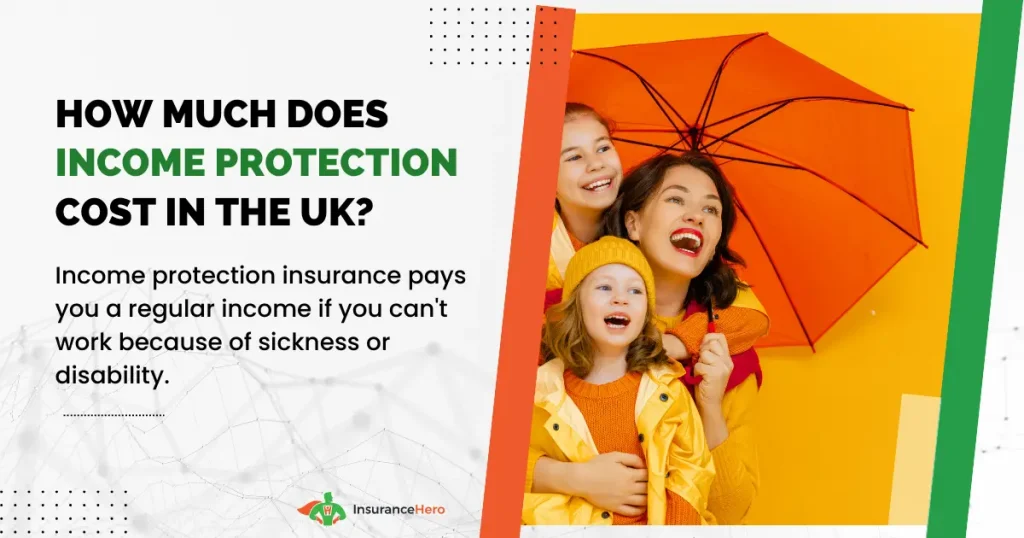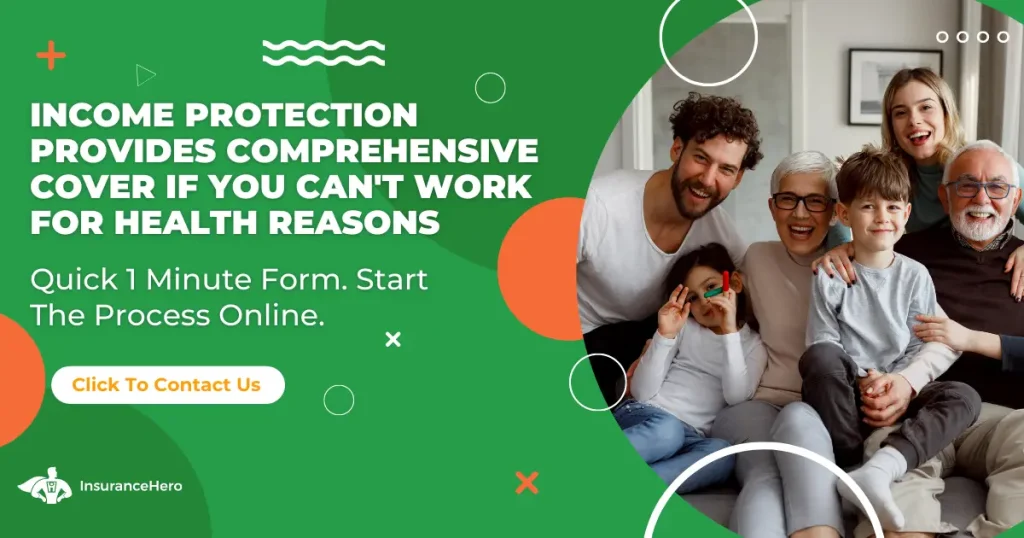The Cost Of Income Protection Insurance In 2025

Are you sometimes worried that in the event of an accident or illness, you wouldn’t be able to support yourself and your family financially?
If so, you should consider getting income protection insurance. Our cost of income protection insurance guide will hopefully answer any questions you have.
An income protection policy pays an equivalent salary if you cannot perform your job for short or long periods.
Some work contracts either don’t pay a salary or may cover only 70-80% of it in case of a serious accident or illness, making it challenging to cover all daily expenses.
With income protection cover, you can choose how long you wish to be paid, how much you wish to be covered, and how fast you can receive the money.
The Benefits Of Income Protection Insurance Coverage:
Insurance Hero can help you find the most comprehensive and cost-effective income protection policies perfectly tailored to your needs.
Here are some reasons why you should consider taking out the cover:
- Typically, payouts from income insurance schemes in the UK aren’t subject to income tax.
- An income protection policy can be tailored to support you until you’re fit to resume work or until you reach retirement age if returning to employment isn’t feasible.
- Receiving a substitute income ensures you can uphold your standard of living until you’re back in the workforce.
- These plans offer flexibility, allowing continuous adjustments to align with shifts in your career and personal circumstances.
- Depending on the provider, you might be able to secure up to 70% of your usual earnings if you are unable to work.
Get Income Protection Quotes From The UK’s Top Companies


How to Choose Income Protection Insurance?
To learn which income protection insurance plan is most suitable for you, it is highly recommended to have an initial consultation with an insurance broker to explore all options available.
Experts at Insurance Hero will listen to your situation, ask you all the relevant questions, and present you with the insurance plans you are eligible for.
If you cannot afford to pay for insurance that covers your whole salary, you can always consider a cheaper option with slightly less coverage. This way, you will have a safety net if you lose your salary due to an accident or illness.
Types of Income Protection Insurance
To understand which income protection policy will help you the most in a time of difficulty, you should know their main types:
| Type of income protection insurance | What does it cover? | What doesn’t it cover? | More details |
|---|---|---|---|
| Accident and sickness cover | You can get a policy covering you until you return to work, retire, or die. | It doesn’t cover you if you’re made redundant. | The insurance will usually cover you if you have one of the following illnesses (the list may vary): ‣ Heart attack ‣ Stroke ‣ Physical disability after an accident at work ‣ Parkinson’s ‣ Severe head injury |
| Unemployment cover | Pays you a replacement salary when you are involuntarily made redundant at your workplace. | The insurance doesn’t cover you if you resign from your job, fall sick, or have an accident that prevents you from working. | The monthly replacement salary is paid tax-free when you are unable to find another job after a pre-agreed period of time. |
| Accident, Sickness and Unemployment cover (ASU) | As the name implies, it covers you when you cannot work due to an illness, accident, or when you lose your job. | The insurance doesn’t cover you if you get fired from your job or have a pre-existing medical condition. | ASU insurance pays a portion of your monthly salary so that you can cover the costs of debts, mortgage payments, or other outgoings. |
| Full income protection cover | Tends to cover about 50%-70% of your monthly income. | Doesn’t usually cover you if you are made redundant. | You can get a policy that will cover you up until you return to work, retire, or die. |
| Partial income protection | Covers a part of your monthly income when you work fewer hours due to an accident or illness. | Doesn’t cover you if you are made redundant. | This policy can cover you up until the moment you are able to return to work full-time. |

When getting insurance cover, you will be faced with another decision to make. Most types of income protection insurance are short-termed. It means you will be paid only for a short period while on sick leave. This can be up to 2 years, depending on the policy.
For some, it should be sufficient time to recover and return to work. However, if you require more, you can find long-term insurance protection policies with five or more years of salary replacement.
The cost of income protection that pays an equivalent salary up until the moment you return to work is considerably more expensive than a short-term plan.
How Much Does Income Protection Cost?
Now that you know what types of income protection cover exist, you should know that their price will depend on several factors. Note that long-term policies usually cost more than short-term ones.
The factors can be divided into two categories: policy-related and personal. Policy factors are how comprehensive you want your cover to be.
This includes the monthly coverage, the waiting period to be paid, the type of premiums, and more. You cannot change personal factors because they are individual to you and your situation.
Policy Factors
So, what is the cost of income protection insurance? You can change a few things when choosing an income protection plan, which will either drop or increase the final price.
These factors include:
- Level of cover: You can select how much money your insurance will pay you monthly. Usually, it is up to 70% of your gross income.
- Deferral period before payout: There is something called the waiting time. It is a period between when you cannot work due to an illness or accident and when the insurer pays you the first benefit. You can have a short deferral period of one month or choose something later.
- Cease age is an insured age at which the income protection insurance ceases. You can set the cease age as an estimated retirement age, between 65 to 70 years old.
- Type of premiums: The protection premium you pay every month is divided into two types:
- Age-banded premiums: An age-banded policy will increase premiums as you get older.
- Guaranteed premiums: As the name suggests, these premiums are guaranteed or fixed. There are no fluctuations, and you know exactly how much you owe monthly.

Here Are Some Real Life Examples
| Age | 26-year-old, £1,600 monthly coverage | £8.67 |
| 54-year-old, £1,600 monthly coverage | £32.01 | |
| Occupation | 27-year-old working in an office environment | £23.04 |
| 25-year-old in a manual role | £38.53 | |
| Health | Healthier individuals | Lower premiums |
| Pre-existing conditions | Higher premiums | |
| Coverage Length | Shorter-term policy at age 26 | £6.14 |
| Longer-term policy at age 26 | £8.27 | |
| Deferred Period | Longer deferred period | Cheaper premiums |
Average Costs
| Coverage Type | Coverage Details | Monthly Premium |
|---|---|---|
| Average Cost | 60% of pre-tax income | £14 |
| Lowest Possible Premium | Basic coverage | £10 |
| Increased Costs | Based on certain influencing factors | Variable |
Personal Factors
Personal factors are mainly the demographic information you provide, so we can present you with options from the leading life insurance companies to compare.
These factors include:
- Age: As you get older, there is a higher chance of falling ill. As a result, the premiums are higher.
- Occupational risk class: The riskier your job is, the higher your premiums are. That is why firefighters would pay more than school teachers.
- Smokers or nonsmokers usually pay a higher premium because they are more vulnerable to serious illnesses.
Medical history: A pre-existing medical condition means you are more likely to fall ill and be unable to work. This can also add to your monthly premiums.
Cost Of Income Protection Insurance FAQs
How can I get an income protection quote?
If you are interested in the cost of income protection insurance, you can receive a no-obligation quote and a call from one of our experts to discuss your case. Later, you can compare plans from the leading life insurance companies.
You can choose cover for yourself or for you and your partner together. Then, you need to choose what type of insurance interests you the most, the amount of coverage, and the length.
Are there alternatives to income protection insurance?
Yes, you could consider getting mortgage payment protection or redundancy protection.
Mortgage payment protection is a form of cover you receive when you lose your job and are unable to pay for mortgage payments due to this.
Redundancy protection is a tax-free monthly cover you receive when you unexpectedly lose your job.
What information should I provide about myself to receive income protection insurance?
You will need to share information such as your age, occupation, whether you are a smoker, and your health history. It will help determine the final income protection insurance cost.
It is best not to hide anything from your insurer and honestly answer the questions about medical conditions.
Is there income protection insurance for those who are self-employed?
Self-employed people who don’t have the option to receive monthly income from an employer when sick can also buy income protection insurance.
You can receive monthly cover of up to 70% of your gross income until you are physically ready to return to your work.


